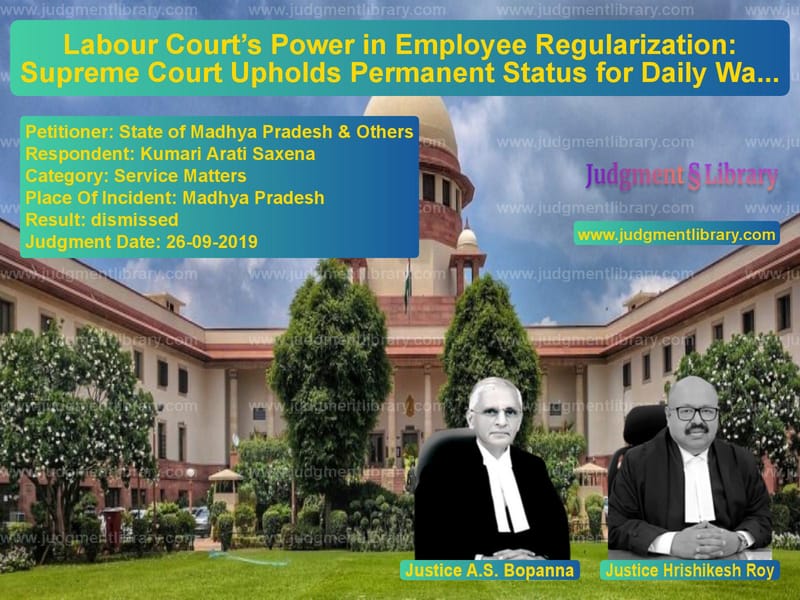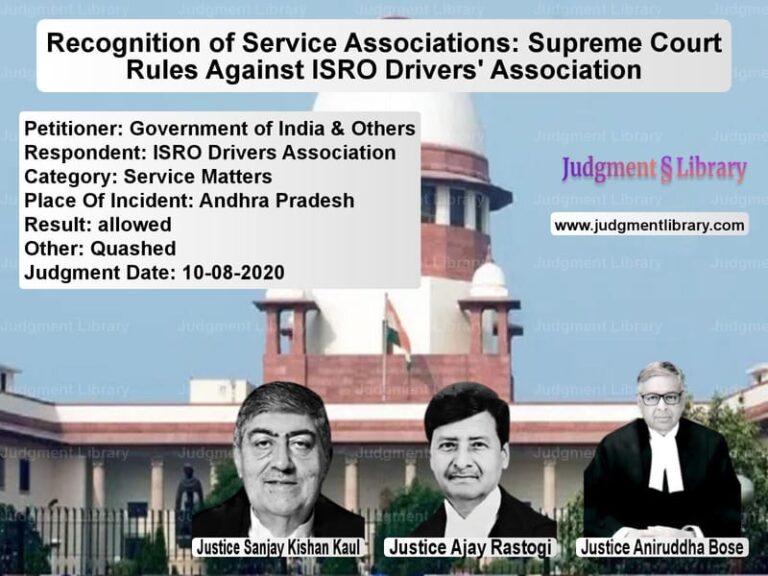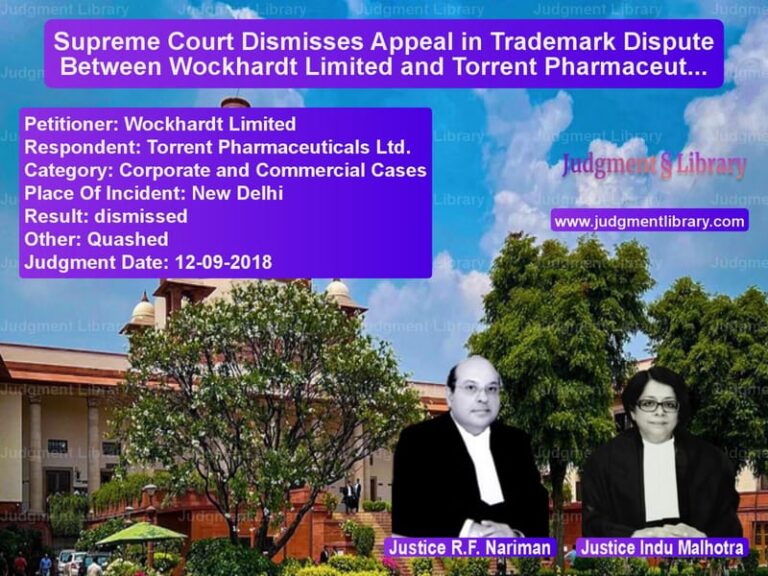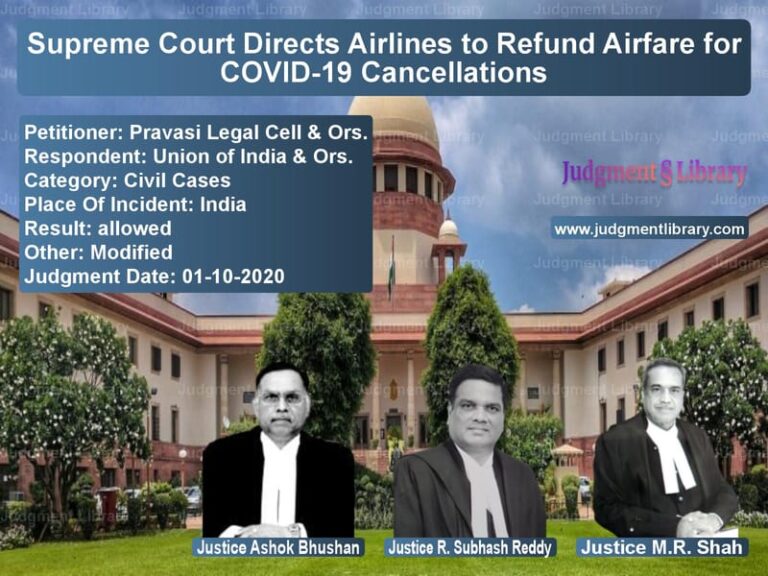Labour Court’s Power in Employee Regularization: Supreme Court Upholds Permanent Status for Daily Wager
The Supreme Court of India, in the case of State of Madhya Pradesh & Others vs. Kumari Arati Saxena, ruled on the rights of a daily-wage employee to claim permanent employment status. The case revolved around the interpretation of the Madhya Pradesh Industrial Relations Act, 1960, and whether the Labour Court had the authority to grant permanent status to an employee under Standing Orders.
Background of the Case
The respondent, Kumari Arati Saxena, was appointed as a Hindi Typist on daily wages on June 5, 1992, in the Public Health Engineering Department, Madhya Pradesh. After working continuously for several years, she filed an application under Sections 31, 61, and 62 of the Madhya Pradesh Industrial Relations Act, 1960, seeking classification as a permanent employee in the post of Junior Division Clerk and claiming a regular salary.
The Labour Court (Additional Presiding Officer, Labour Court No.1, Gwalior), in its award dated March 10, 2000, ruled in favor of the respondent, granting her permanent employee status. The State of Madhya Pradesh challenged this decision in an appeal before the Appellate Authority, which upheld the Labour Court’s order. Dissatisfied, the State filed a writ petition before the Madhya Pradesh High Court (Gwalior Bench), which also dismissed the appeal on February 16, 2010. The matter then reached the Supreme Court.
Key Legal Questions Considered
- Whether a daily-wage worker can be granted permanent employment status under Standing Orders.
- Whether the Labour Court’s order was justified in classifying the respondent as a permanent employee.
- Whether the High Court was correct in refusing to interfere with the Labour Court’s decision.
- Whether the classification of the respondent as a Hindi Stenographer based on a departmental order was legally sustainable.
Arguments by the Petitioner (State of Madhya Pradesh)
The State of Madhya Pradesh contended:
- The respondent was appointed as a daily-wage worker without any clear vacancy or regular appointment process.
- The Madhya Pradesh Industrial Employment (Standing Orders) Rules, 1963, allow for classification of employees, but only in cases where the appointment was against a sanctioned post.
- The Labour Court’s decision was erroneous as it misinterpreted the applicability of Standing Order 2(vi), which defines conditions for permanent employee classification.
- The Madhya Pradesh High Court failed to appreciate the State’s argument regarding the erroneous classification of the respondent as a Hindi Stenographer based on an internal order dated November 17, 2004.
Arguments by the Respondent (Kumari Arati Saxena)
The respondent countered:
- She had worked continuously for more than six months on a vacant post, which under the Standing Orders entitled her to be classified as a permanent employee.
- The Labour Court had rightly determined her status based on evidence of continuous service and compliance with employment rules.
- The State had itself recognized her classification as a Hindi Stenographer, and therefore, its challenge was not maintainable.
- The appeal against the High Court’s ruling was not justified, as all lower forums had concurrently ruled in her favor.
Supreme Court’s Observations
The Supreme Court analyzed the provisions of the Madhya Pradesh Industrial Relations Act, 1960, and the Standing Orders governing industrial employment. It made the following key observations:
- The Labour Court’s role is to examine whether an employee satisfies the conditions for permanent status as per Standing Order 2(vi).
- Once an employee has worked for more than six months continuously on a vacant post, they are deemed to be a permanent employee.
- The findings of the Labour Court were not perverse and were based on evidence that the respondent had worked continuously and met the necessary conditions.
- The High Court had correctly upheld the Labour Court’s decision, and no legal grounds existed to interfere with it.
Final Judgment
The Supreme Court ruled in favor of the respondent and dismissed the appeal filed by the State of Madhya Pradesh. The Court held:
“The respondent has rendered continuous service and meets the criteria under the Standing Orders. The Labour Court’s order granting permanent status is legally justified and does not warrant interference.”
The State of Madhya Pradesh was directed to implement the Labour Court’s order and process all pending service benefits for the respondent.
Implications of the Judgment
- For Daily Wage Workers: The ruling strengthens the legal framework for workers seeking regularization based on continuous service.
- For Employers: Government departments must comply with the Standing Orders and cannot arbitrarily deny regularization to eligible employees.
- For Labour Courts: The decision reinforces the authority of Labour Courts in granting permanent status when legal conditions are met.
- For Public Sector Employment Policies: This judgment highlights the need for transparency in appointment processes to prevent litigation.
Conclusion
The Supreme Court’s ruling in this case reinforces the rights of workers under industrial employment laws and ensures that employees meeting the prescribed criteria are not denied regularization. By upholding the Labour Court’s decision, the judgment provides strong legal protection for daily-wage employees seeking permanent employment under the Madhya Pradesh Industrial Relations Act.
Petitioner Name: State of Madhya Pradesh & Others.Respondent Name: Kumari Arati Saxena.Judgment By: Justice A.S. Bopanna, Justice Hrishikesh Roy.Place Of Incident: Madhya Pradesh.Judgment Date: 26-09-2019.
Don’t miss out on the full details! Download the complete judgment in PDF format below and gain valuable insights instantly!
Download Judgment: State of Madhya Prad vs Kumari Arati Saxena Supreme Court of India Judgment Dated 26-09-2019.pdf
Direct Downlaod Judgment: Direct downlaod this Judgment
See all petitions in Employment Disputes
See all petitions in Public Sector Employees
See all petitions in Workplace Harassment
See all petitions in Judgment by A. S. Bopanna
See all petitions in Judgment by Hrishikesh Roy
See all petitions in dismissed
See all petitions in supreme court of India judgments September 2019
See all petitions in 2019 judgments
See all posts in Service Matters Category
See all allowed petitions in Service Matters Category
See all Dismissed petitions in Service Matters Category
See all partially allowed petitions in Service Matters Category







